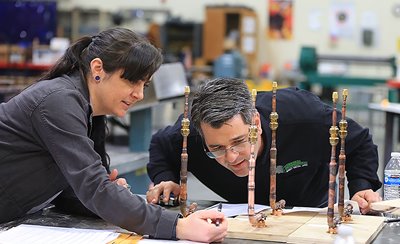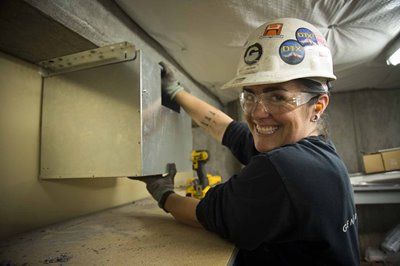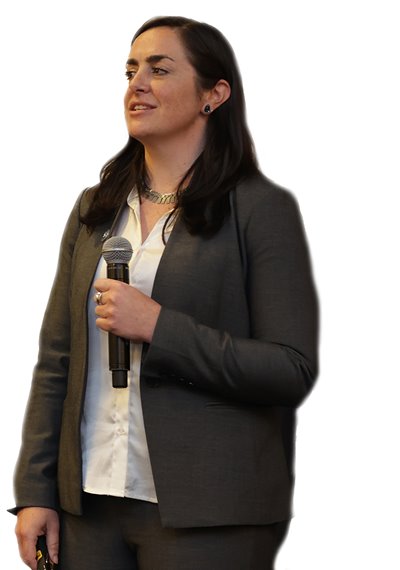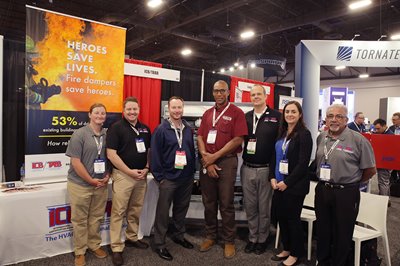 "How does it work?"
"How does it work?"
Lisa Davis never stops asking this question. “I’m a systems sort of person, interested in how one thing affects another,” relates Davis, who was named administrator of the National Energy Management Institute (NEMI) in April. She is the first woman to hold this position.
Back in 2008, when she Googled, “What can women do in the trades?” she initially thought: “Am I even allowed in the trades as a woman?” she says.
But a construction career pre-apprenticeship popped up with the Oregon Tradeswomen. The group was offering a program packed with experiences that included learning construction math, working on job sites building homes for Habitat for Humanity, touring
contracting businesses and visiting union halls.
Immediately, Davis was hooked — specifically, with the idea of working with metal and machining. “To be perfectly honest, at the time, I had been a mechanic for motorcycles and wanted to start fabricating my own gas tanks,” she says, quickly adding, “That is not at all what the sheet metal industry is. So, I’ve made zero gas tanks. But I’ve done a whole lot more.”
She helped build an oil rig that floated up the western coast to Alaska. She completed projects in the hospitality industry, high-tech sector, hospitals and healthcare facilities with her first job at General Sheet Metal in Portland under mentor/owner Carol Duncan.
 Aside from a curious nature to find out how things work throughout her career, another question Davis never stopped asking is, “Why not?”
Aside from a curious nature to find out how things work throughout her career, another question Davis never stopped asking is, “Why not?”
Why can’t we open doors for all people to pursue trades careers and “give everyone the opportunity to bring their authentic selves to work?”
How can we be more intentional with cultivating mentorship programs that incorporate trades skills and life skills? “Some of my best moments have been the coaching aspect of teaching,” says Davis, whose most recent position before NEMI was serving as a testing, adjusting and balancing (TAB) service specialist and director of retention and recruiting for the Industrial Training Institute (ITI).
Now at NEMI, following a thorough strategic planning process for the fund, Davis says, “We are one of the best-kept secrets.”
“Definitely, our No. 1 goal is to give more clarification and messaging about who we are, what we provide and the value we can offer.”
Connecting the Dots
Davis dials back to when she discovered the trades, calling her journey from medical school to labor union a “meandering story.” However, the path is entirely intentional and interconnected, with stops along the way that integrate hands-on skills, a knack for sharing knowledge, a love of learning and a passion for mentorship.In fact, hands-on mechanical service and teaching “are my top two greatest loves of all time,” Davis says, explaining how she “woke up one day” while studying medicine to become a physician and thought, “I don’t think I want to do this today.” The next day, she had the same feeling: “I don’t want to do this today either.”
Then a bigger wakeup call: “I better get a job.”
 She ended up working as a mechanic in a bowling alley. That was after two years as a perfusion assistant at Oregon Health and Science University in Portland, monitoring medical equipment that keeps patients’ hearts and lungs functioning during surgeries. Naturally diving into the mechanics, Davis explains, “There are a series of four pumps that puts a person on bypass during open-heart surgery.”
She ended up working as a mechanic in a bowling alley. That was after two years as a perfusion assistant at Oregon Health and Science University in Portland, monitoring medical equipment that keeps patients’ hearts and lungs functioning during surgeries. Naturally diving into the mechanics, Davis explains, “There are a series of four pumps that puts a person on bypass during open-heart surgery.”
“As a how-things-work person, I’m looking at the human body as a series of levers and pulleys,” she continues. “We have a pump and filters and an electrical system. We have all of these inherent systems, so teaching anatomy from that standpoint — as a mechanical system — was fascinating to me.”
It’s no surprise that prior to a grueling job essentially sustaining patients on life support, Davis taught gross anatomy in a morgue for pre-med students at the University of California at Davis. She completed a bachelor’s degree in microbiology there.
Davis taught rock climbing ats well.
Arguably, she has been climbing a big rock called gender equality in the trades for 15 years.
“From a rock-climbing perspective, how do we implement our anatomy to our advantage?” she relates. “How do we exploit that to get to the top of the rock wall or mountain?”
Her climb began when she realized the bowling alley was a dead-end job, yet she wanted to pursue a satisfying, hands-on career. She landed on the Oregon Tradeswomen pre-apprenticeship program, and the group later provided Davis with a grant to take a machining class. In 2010, she was accepted into a sheet metal workers apprenticeship program at SMART Local 16 of Oregon and Southwest Washington. Growing experience at General Sheet Metal, she was exposed to architectural work — and service, a division she helped grow.
“It was my jam,” she says of fire damper work, light commercial service and rebuilding fans.
Davis’s inquisitive nature and tireless work ethic fast-tracked her industry career. She helped create General Sheet Metal’s service apprenticeship and was recruited by SMART Local 16 full-time to do the same.
“Seeing the deep impact I could make at a local level, I then had an opportunity to have a broader impact over all of the locals and to touch different instructors, who in turn, had deep impacts at their locals,” Davis says of moving to the International Training Institute (ITI) as an apprenticeship program instructor. She eventually became its director.
 Essentially, Davis was teaching the teachers.
Essentially, Davis was teaching the teachers.
Davis reflects on her mentors. “None of this work is done in a vacuum,” she relates.
One of the many is Connie Ashbrook, who helped found Oregon Tradeswomen. “She has followed my career every step of the way and is an incredible advocate,” she says.
And another influence and support, Connie Duncan, serves with Davis on the Belonging and Excellence for All (BE4ALL) subcommittee, Pedal to the Metal, which focuses on recruiting and apprenticeship standards.
Launched in 2021, BE4ALL is a joint effort of SMACNA, SMART (International Association of Sheet Metal, Air, Rail and Transportation Workers) and ITI designed to elevate the work culture to attract and retain skilled talent regardless of race, gender, religion, sexual orientation, ethnicity or nationality.
Basically, it’s a movement to “come one, come all” — an open invitation to the industry table.
The message speaks to Davis, who says throughout her career, “I have been able to incorporate my full self. We all have our own life experiences, we are all sheet metal workers and we are all in this industry striving for the same goals.”
Still, Davis is in a unique position as a woman leader in the trades. “There is this internalized conditioning that, at least for myself, we have this feeling that we have to prove ourselves on every job, in every position,” she relates. “We have to prove we know what we are doing.”
Davis adds, “An unsaid rhetoric of, ‘You’re really good for a woman,’” is fading somewhat with efforts like the SMART International Women’s Committee, where she is a policy sub-committee chair focused on recruiting, retention, community relationships and inclusion. Throughout her career, Davis says she has been surrounded by encouraging, inspiring leaders and colleagues.
“Lisa has had the words ‘first woman’ attached to her name a lot over the past several years,” says Dan McCallum, executive director of the Funds, in a report about her rise to NEMI administrator. In a statement to Air Conditioning, Heating, Refrigeration (ACHR) News, he adds, “She was the most qualified candidate for the job.”
Advancing the Industry
Davis is on a lifelong quest to learn and teach. When the administrator position opened at NEMI, she again asked, “Why not?”
As a fund that offers education and training, including developing industry-recognized certifications and reviewing legislative efforts, Davis’s experience paved an inroad to the role. “There are a lot of education and resources we have to offer,” she says, planning to grow the menu.
For instance, NEMI partners with Mesa, Arizona-based Evergreen Telemetry, a TAB instrument manufacturer. Evergreen is creating get-started TAB kits for contractors who want to explore this work and the indoor air quality sector.
“Evergreen has been generous with our Local Joint Apprenticeship Training Committees (JATC) and training centers, donating about $15,000 in instruments each month,” she says, adding that the company also trains centers to properly use the instruments.
The idea is a SMACNA contractor can connect with Evergreen, request a TAB kit coordinated by NEMI, and access the tools they need for a discounted cost. There are also rental and rent-to-own options, Davis says. “That is just one initiative we launched this month.”
She adds, “I’m looking forward to furthering the scope of TAB, particularly when it comes to being certified by the International Certification Board (ICB). We already got TAB into the U.S. General Services Administration (GSA) specs, which is a huge step.”
Davis says NEMI is pursuing efforts to get TAB into U.S. Department of Defense (DoD) specs and others “so TAB is more widely recognized and celebrated.”
A strategic effort to refine NEMI’s messaging to the market will build awareness. “We have an alphabet soup of acronyms in our corner of the world,” Davis acknowledges of outreach efforts. “We can assist with seeking legislation opportunities to pursue new work. We can perform awareness.”
Also on the horizon is the 2024 ICB conference in St. Louis, Missouri, which will include a range of training and certification opportunities, including a business track. “Speakers will give seminars on all different aspects of the industry,” Davis says, a consistent advocate for education and skills acquisition.
Ultimately, her goal — in simplified terms — is to inspire more people from all walks of life to explore “how things work” in the construction and sheet metal trades, much like she did. “And I never looked back,” Davis says.